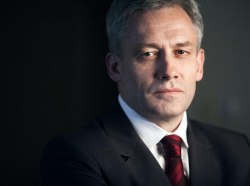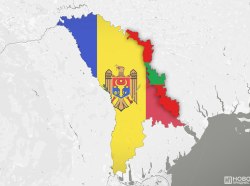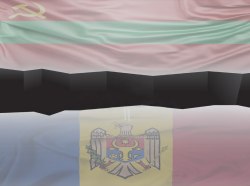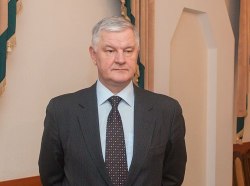The situation around Pridnestrovie remains tense. The 5+2 format talks (Maoldova and Pridnestrovie - conflict sides, Russia and Ukraine - guarantors and mediators, OSCE - mediator, EU and USA - observers) were last held a year and a half ago.
Russia's MFA final report notes the stagnation of the negotiation process and calls restrictive measures taken by Moldova and Ukraine against Pridnestrovie the main reason of the dialogue’s slowdown.
Instead of the small steps tactics, proposed by Pridnestrovie's leadership back in 2012 and backed by all negotiation participants, Molodova has adopted a policy of unilateral non-systemic activities aimed at Pridnestrovie's economic suffocation and the reduction of Russia's role in negotiations.
Farewell, common sense!
It became known in November 2015 that Kishinev and Kiev had signed an agreement on the establishment of joint customs checkpoints at the border with Pridnestrovie. It is indicative that Pridnestrovie's leadership and Russian representatives were not officially informed about this decision and learnt about the agreement through the mass media.
In an interview with Rysskaya Planeta, Pridnestrovie's foreign minister Vitaly Ignatyev said "these actions are shorn of common sense as they are ruining the negotiation structure as it is."
"The decision to establish joint control at the Ukrainian-Pridnestrovian border has been made outside the international 5+2 talks format, which goes counter to the underlying principles of negotiations, the very spirit of the dialogue and is legitimate," underscored Ignatyev.
The head of the Pridnestrovian delegation to the Joint Control Commission (governing body of the peacekeeping operation), Oleg Belyakov, noted that the joint checkpoint is a gross violation of the memorandum "On the principles for the normalization of relations between the Republic of Moldova and the Dniester region", signed in 1997 by the leaders of Russia, Ukraine, Pridnestrovie and the OSCE.
"It should be borne in mind that Russia and Ukraine have become guarantors of the commitments made by the conflict sides. And now Ukraine places Moldova's uniformed servicemen in its territory, which may escalate the situation in Pridnestrovie, including in the Security Zone," said Oleg Belyakov in an interview with Russkaya Palneta.
The construction of such a checkpoint is already underway in the Ukrainian village of Kuchurgan. This was confirmed by the Odessa governor, Mikhail Saakashvili, during his visit to the border. The Georgian-born Ukrainian official, known for his anti-Russian provocations, examined the checkpoint's infrastructure and mentioned the equipment of the Moldo-Ukrainian customs checkpoint.
Pressure towards integration
Pridnestrovie's economic ministry has already analysed risks and losses which may be caused by triple customs control. According to a deputy minister of economic development, Dmitry Boltrushko, the joint Molod--Ukrainian control will result in additional costs for Pridnestrovie's economic entities.
"Pridnestrovie's economic agents are very likely to be forced to file customs declarations to Moldova's customs authorities (one 15-item declaration costs $50-55) and incur transportation costs due to cargo detention," he noted.
It should be noted that Molodovan and Pridnestrovian requirements for the quantity of goods which can be brought for the personal use (without declaring them) are very different. According to the Moldovan legislation, their price cannot exceed 300 euros per person, whereas according to the Pridnestrovian laws - $1,000.
Moreover, according to Dmitry Boltrushko, the Moldovan list of the checkpoints which are designed for the importation of food products does not include the Kuchurgan checkpoint. "This is fraught with a food blockade," he said, noting that it is through the Kuchurgan-Pervomaysk checkpoint most of food products come to Pridnestrovie.
The problem of joint Moldo-Ukrainian control will be a serious test for the Pridnestrovian economy, which is already in the doldrums. Amid the collapse of international economies, the country's GDP fell by 18.7% only in the first half of 2015. The trade turnover decreased by nearly a quarter last year. Nevertheless, Pridnestrovie's leadership has managed to keep the national currency from depreciation, maintain financial and social stability, which both Moldova and Ukraine are lacking for.
According to Pridnestrovie's foreign minister, Moldova's control at the Pridnestrovian-Ukrainian border may "in fact ruin not only individual businesses, but also crucially hit Pridnestrovians' living standards."
"The already difficult situation with freedom of movement for citizens and vehicles will be further complicated. The people crossing the border will face, in fact, triple customs and border control. Another and very critical issue is security. The placement of Moldova's men of power at the Ukrainian border may significantly change the regional balance of powers, thus increasing the risk of escalation of the situation," Vitaly Ignatyev believes.
The foreign minister notes that it is the control over the Pridnestrovian-Ukrainian border which Moldova lacked for to impose a full-fledged blockade on Pridnestrovie.
"The presence of Moldovan customs officers at the Kuchurgan checkpoint must solve this "issue", as it is designed by Moldova. It is no accident that the head of Moldova's border police department, Dorin Purice, has called the Moldo-Ukrainian agreement on joint control "the realisation of a long-held dream". In this respect, Purice's statement is very indicative and symptomatic for the Moldovan political elite, taking into account that the "dream" is actually the creation of a "reservation" in Pridnestrovie - unbearable living conditions for the republic's half a million population," says the Pridnestrovian diplomat.
"Rocking the boat" tactics
The attempts by Moldova's governing elite to rock "the supporting structures of the peacekeeping operation", which is considered one of the most successful peacekeeping operations ever (there have been no incidents of armed aggression in 23 years), may lead to serious implications.
Amid the aggravation of Russian-Ukrianian relations and Kiev's denouncement of agreements on the transit of military cargo for the Russian peacekeepers in Pridnestrovie, Moldova began to filter the Russian servicemen who come to the place of employment in the Security Zone. According to Oleg Belyakov, last year alone 47 Russian servicemen were deported back to Russia, and at the same time the Moldovan delegation to the JCC has been refusing to approve a new Russian member of the JCC for over four months.
"Such actions can be regarded as an attempt to restrict Russia's influence in the region, and Russia is the key guarantor of the peacekeeping mission. The target is to exclude the Russian Federation from the peacekeeping process in the region with the subsequent "defrost" of the conflict, to transform the existing operation into a civil-police mission under the aegis of the EU, which would comply with Moldova's unitary aspirations," underscored Oleg Belyakov.
According to experts, regular attempts by the constantly changing Moldovan leadership to unbalance the negotiation process, as if by order, and escalate the already difficult situation around Pridnestrovie will persist in case Kishinev keeps the pro-European government.
"In case the centre-right coalition wins outright, its Pridnestrovian policy will be based on the same principles: pressure in all directions, creating all possible difficulties, restrictions, blockades, establishing a special zone of the Moldovan control along the Ukrainian-Pridnestrovian border and so on. In other words, Pridnestrovie will be forced into reintegration," says Pridnestrovian political expert Ilya Galinsky.
At the same time, according to the expert, in event pro-Russian forces come to power, there may appear a plan for the settlement of the Pridnestrovian conflict under Russia's political guarantees.
The present situation in Moldova, according to the apt remark by Moldovan political commentators, is similar to a "red-hot frying pan". The corruption of public authorities has provoked a severe political crisis and mass protests. The disaffected citizens have already attacked the Moldovan parliament to "forklift" their "pro-European" political elite. If Kishinev will face the reset of power and which will be the power structure in Moldova is difficult to predict today. Only one thing is evident: the construction of the joint Moldo-Ukrainian customs checkpoint at the Pridnestrovian border is underway.








